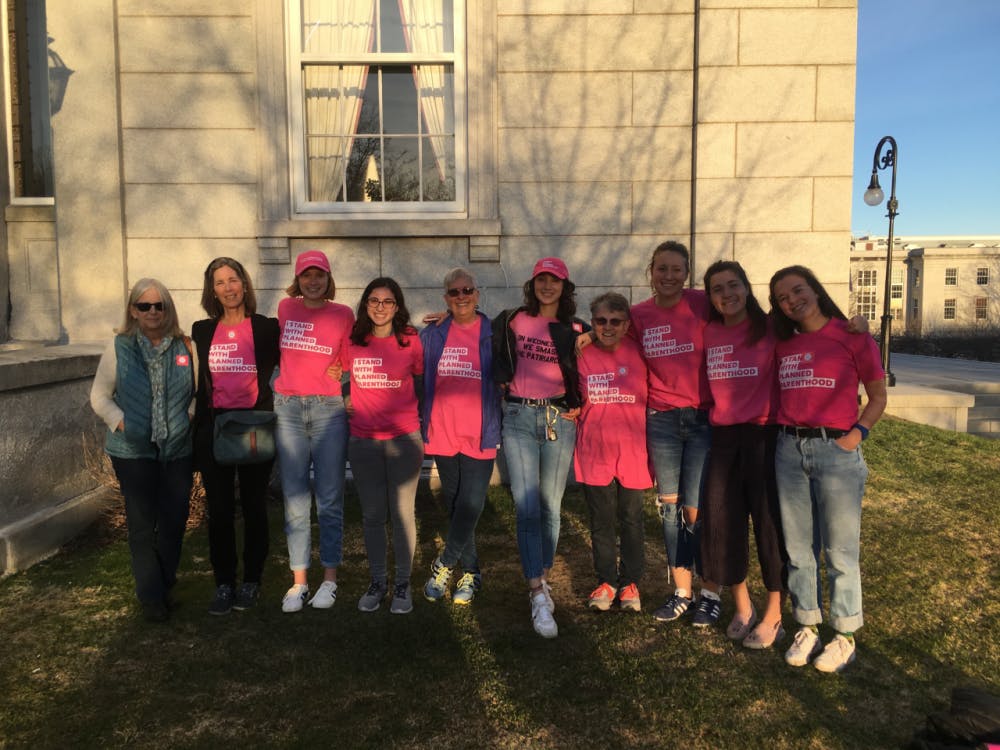MONTPELIER — This past Wednesday, April 13, the Vermont House of Representatives held a hearing for State Representatives to listen to constituent testimony about Proposition 5, a proposed state constitutional amendment over the Right to Personal Reproductive Liberty. Feminist Action at Middlebury (FAM) provided transportation for students to the Statehouse in Montpelier, where the hearing was held.
This proposed legislation exists within the context of the United States at large, where a national debate over abortion has been taking place for years, with the 1973 Supreme Court case Roe v. Wade as a legal backdrop. While Roe v. Wade currently protects abortion across the country, five states have recently proposed “trigger laws” which would immediately criminalize abortion if Roe v. Wade were overturned, with potential consequences for those seeking abortions as severe as the death penalty. With this in mind, if legislators act to amend the State Constitution to preserve a woman’s right to choose, it would hold national significance — especially given that Vermont’s constitution is one of the shortest and most difficult to revise.
The proposition is still in the early stages of the amendment process, and has been passed in the Vermont Senate with a vote of 28-2. The next step is a vote in the House of Representatives, but Proposition 5 will need majority votes in the Senate and House legislature as well as a vote of Vermont residents before it is ratified.
Vermont typically cultivates a politically liberal image, something reinforced among other elements by Senator Bernie Sanders’s runs for presidential office as well as recent environmental legislation and activism. However, the reality of Vermont political energy is much more complicated. Vermont did pioneer legislation on same-sex marriage (Baker v. Vermont 1999) and environmental oversight (Environmental Oversight Act of 1970), two incidents of progressive lawmaking that set national precedents. On the other hand, a cultural emphasis on property rights, gun ownership and individual privacy within Vermont tie into typically conservative priorities. Vermont is one of eight states that allow concealed carry without any permit, a classic pillar of conservative policy. Of those eight states — Alaska, Arizona, Arkansas, Kansas, Maine, Vermont, West Virginia, and Wyoming — only Maine and Vermont have voted Democratic for any presidential election in the past 20 years. Recent decades have seen the Democratic and Republican parties concentrating in urban and rural areas respectively, making Vermont an especially interesting case study.
So, if Vermont tends to act progressively with environmental regulation and more conservatively when faced with, say, gun control, what happens when it’s faced with the ever-divisive abortion debate? The answer is: it’s complicated.
For one, as with many states, the local pro-life movement in Vermont is incredibly well-organized and vocal. A Google search of “Vermont PR.5” brings up four separate links to the Vermont Right to Life Committee within the first page of results. No such links exist to pro-choice groups. That said, many Vermont residents do support the right to choose an abortion, as evidenced by the Senate 28-2 vote in favor of PR.5.
The hearing on Wednesday, then, exposed a wide rift in opinion among voters. Perhaps to avoid confrontation or perhaps just to streamline the process of the public hearing, both those in favor of the proposition and those against entered the Statehouse from different sides of the building. The Planned Parenthood VT Action Fund offered trademark-pink shirts to arriving supporters, and as a result many of those in the chamber wore T-shirts emblazoned with “I Stand With Planned Parenthood.”
Constituents were each allowed the chance to testify for two minutes before a committee and the general public, often reading their thoughts from prepared notes. Several of those speaking in favor of Proposition 5 noted that they had not planned to speak, but were moved to express their support by others’ testimony. Others had pages of printed opinion of which they only had time to read portions. Despite rules against posters in the House chamber, one constituent displayed a poster of a fetus until he was asked to put it away.
Testimonies in favor of the proposition included opinions from health educators and nurses. Students and retirees alike consistently returned to themes of bodily autonomy, liberty and the freedom that comes with a right to choose.
Those against the proposition often spoke of their religious affiliations and the ethical concerns over fetal life, bringing up concepts of sin, crime and the duty of motherhood. Several of those speaking against the proposition cited medically, financially and scientifically inaccurate information about abortions and Planned Parenthood. These claims included that Planned Parenthood made billions of dollars from abortions, used fetus body parts to create humanized lab rats on which to test HIV and engaged in advertising campaigns to “increase demand” among American women for abortion.
“It’s strange to hear such radical opinions and misinformation from people in my own state and community,” said Emma Bernstein ’21, a FAM member who helped organize transport to the Statehouse. “I know those beliefs exist, but I never think of them being expressed by people I could pass on the street.”
Regardless of the divided testimonies, many of those who traveled to Montpelier with FAM expressed their interest in witnessing the process of local politics. “Especially since Vermont is such a small state, I really felt like my presence there mattered,” said Haley Goodman ’21.“I hope it passes.”
The House of Representatives has yet to vote on Proposition 5.
Correction: An earlier version of this article misidentified the final vote total. There are thirty members of the Vermont Senate.
Legislative Protections for Abortion Rights Clear Vermont Senate

Paige Feeser
Middlebury students and activists stand with Planned Parenthood at the Statehouse in Montpelier.
Middlebury students and activists stand with Planned Parenthood at the Statehouse in Montpelier.
Comments



